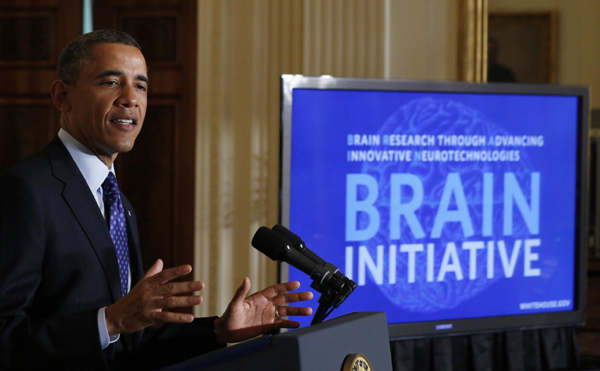Obama unveils initiative to study human brain
Updated: 2013-04-03 15:06
(Xinhua)
|
||||||||
 |
|
US President Barack Obama announces his administration's Brain Research through Advancing Innovative Neurotechnologies (BRAIN) Initiative at the White House in Washington, April 2, 2013. [Photo/Agencies] |
WASHINGTON - US President Barack Obama on Tuesday unveiled a 100-million-US-dollar initiative to unlock the mystery of human brain in hopes of eventually finding cures for disorders like Alzheimer's, epilepsy and traumatic injuries.
The initiative, dubbed Brain Research through Advancing Innovative Neurotechnologies, or BRAIN, is to be funded from the fiscal 2014 federal budget, which is slated to be released next week.
"The BRAIN Initiative will accelerate the development and application of new technologies that will enable researchers to produce dynamic pictures of the brain that show how individual brain cells and complex neural circuits interact at the speed of thought," the White House said in a statement.
"These technologies will open new doors to explore how the brain records, processes, uses, stores and retrieves vast quantities of information, and shed light on the complex links between brain function and behavior."
The money to study the brain would support research by the US National Institutes of Health, the Defense Advanced Research Projects Agency and the National Science Foundation.
In his State of the Union address in February, Obama said, "If we want to make the best products, we also have to invest in the best ideas," and alluded to scientists "mapping the human brain to unlock the answers to Alzheimer's."
The initiative is one of the Obama administration's "Grand Challenges" -- ambitious but achievable goals that require advances in science and technology. In his remarks Tuesday, Obama called on companies, research universities, foundations, and philanthropists to join him in identifying and pursuing the Grand Challenges of the 21st century.
- Obama family enjoys Easter Egg Roll with children
- Obama makes plea for gun control legislation
- Obama hosts 2012 MLS, NHL Cup winner at White House
- Obama pushes immigration overhaul
- Obama to face scrutiny on Syria during Jordan visit
- Obama in the Mideast
- Obama picks Indiana to win NCAA basketball championship
- Obama welcomed at Israeli airport
- Many questions await Obama on Mideast visit

 Li Na on Time cover, makes influential 100 list
Li Na on Time cover, makes influential 100 list
 FBI releases photos of 2 Boston bombings suspects
FBI releases photos of 2 Boston bombings suspects
 World's wackiest hairstyles
World's wackiest hairstyles
 Sandstorms strike Northwest China
Sandstorms strike Northwest China
 Never-seen photos of Madonna on display
Never-seen photos of Madonna on display
 H7N9 outbreak linked to waterfowl migration
H7N9 outbreak linked to waterfowl migration
 Dozens feared dead in Texas plant blast
Dozens feared dead in Texas plant blast
 Venezuelan court rules out manual votes counting
Venezuelan court rules out manual votes counting
Most Viewed
Editor's Picks

|

|

|

|

|

|
Today's Top News
Live report: 7.0-magnitude quake hits Sichuan, heavy casualties feared
Boston suspect cornered on boat
Cross-talk artist helps to spread the word
'Green' awareness levels drop in Beijing
Palace Museum spruces up
First couple on Time's list of most influential
H7N9 flu transmission studied
Trading channels 'need to broaden'
US Weekly

|

|







